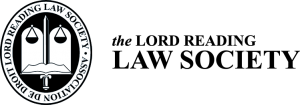
2004-2005 Ted Goloff
REFLECTIONS ON A PRESIDENCY
The stewardship of the Lord Reading Law Society became mine in June of 2004. In my opening address, I made reference to the fact that the Society was born out of the bigotry of 1948, but that evidence of such intolerance was still present. Little did I know that on the very day that the annual LRLS Human Rights Award would be presented to the 2004 joint recipients, the B’nai Brith Anti- Defamation League and the Canadian Jewish Congress, and of a moving and articulate address of his Excellency Alan Baker, Ambassador of Israel, I would be writing to the Syndic of the Barreau du Québec asking that a review be made of the scurrilous remarks of a certain confrere, in a brief to the Supreme Court in the Mugesera Case, regarding the elevation to the Supreme Court of one of the Society’s most prestigious members, Madam Justice Rosalie Abella, by another recipient of our Human Rights Award, our own Honourable Irwin Cotler, to determine if they constituted violations of the Bar Act or its Regulations.
That very same evening, the Society moved forward on its attempt to have the Barreau du Québec and/or the Barreau de Montréal, adopt a Resolution condemning anti-semitism and all forms of racism as an affront to the legal traditions that we, as members of the Bar and Bench, hold near and dear, efforts that are ongoing until today.
A short few weeks after my tenure came to an end, the Supreme Court castigated Me Bertrand for his allegations in his pleadings, Chief Justice McLachlin writing for a unanimous court:
«17 Regretfully, we must also mention that the motion and the documents filed in support of it include anti-Semitic sentiments and views that most might have thought had disappeared from Canadian society, and even more so from legal debate in Canada. Our society is a diverse one, home to the widest variety of ethnic, linguistic and cultural groups. In this society, to resort to discourse and actions that profoundly contradict the principles of equality and mutual respect that are the foundations of our public life shows a lack of respect for the fundamental rules governing our public institutions and, more specifically, our courts and the justice system.»
This is not to take away one iota from the importance of that special evening’s address from the Ambassador, made only a short few weeks after the World Court, in The Hague, determined, with the notable dissent of the American judge, that the fence that Israel had built after the bombings and other atrocities that followed the beginning of the second Intifada was illegal. Even critics of Israeli policy noted that the Ambassador’s address was perhaps the most closely reasoned defence of the Israeli position that had been presented publicly. No doubt the fact that Ambassador Baker was himself a Senior Legal adviser to the Israeli Foreign Ministry prior to his appointment added to the cogency of his delivery.
All however was not gloom and doom during my year. Indeed, one of the highlights was the kick off program, just before Rosh Hashana 2004, when Mr. Justice Binnie of the Supreme Court, taught us much about Rufus Isaacs, the first Marquis of Reading, for whom the Society is named. His dry humour kept us all in stitches for the better part of an hour, and we were all the better for it.
There were also presentations during the year on humour in the law, of alternative career paths open to lawyers, and building and managing a multinational law firm.
It was also the year the Society sought to elevate the debate regarding same sex-marriage by hosting a seminar at which the various positions could be examined.
And then, at year’s end, what better way for me, to «pass the potato chips» on to Alan Adel, my successor, then following the remarks of Mme Justice Pierrette Rayle, recounting for us her distinguished career both at the Bar, as a Trial Court Judge, and then as a forceful Appellate Court Judge.
All in all, an eventful year for the Society.



